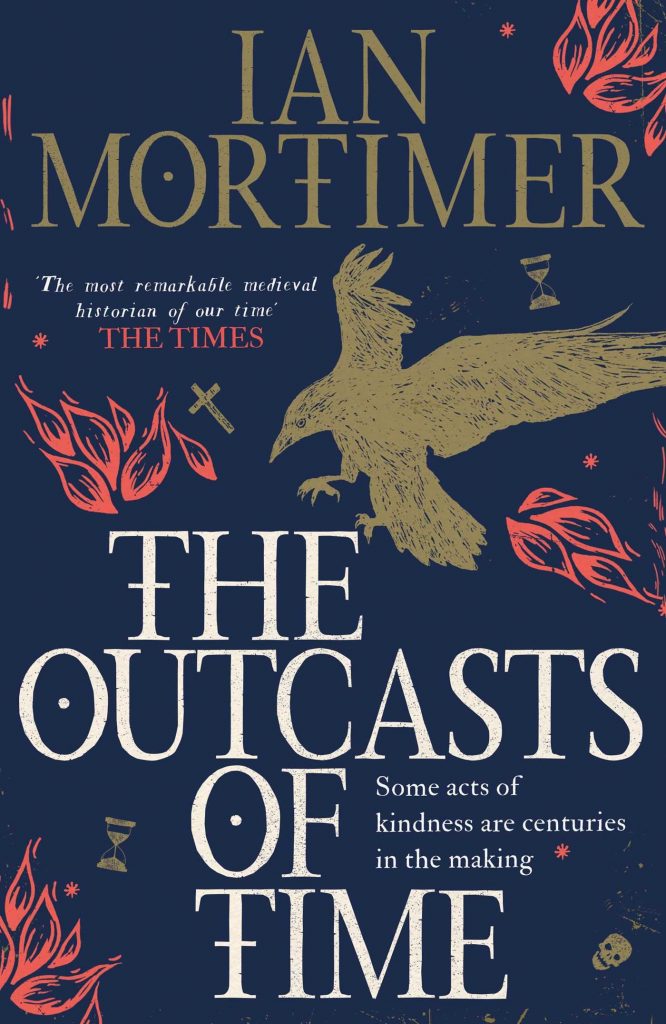Book Review : The Outcasts of Time by Ian Mortimer
 The Outcasts of Time by Ian Mortimer
The Outcasts of Time by Ian Mortimer
My rating: 5 of 5 stars
I bought this book whilst I was still reading Ian Mortimer’s “Edward III: The Perfect King” as I wanted to see whether his fiction writing was as engaging as his historical narrative. In a nutshell, it was. Indeed the story starts from the time of Edward III in December 1348 when the country is in the grip of the Black Death and brothers John and William fear that they will shortly die and go to Hell. But they are given an unexpected choice: either to go home and spend their last six days in their familiar world, or to search for salvation across the forthcoming centuries – living each one of their remaining days ninety-nine years after the last. And so they begin a journey from 1348 to 1447, 1546, 1645, 1744, 1843 & 1942 all in the space of less than 1 week from the perspective of the travellers!
The idea is deeply fascinating, especially if you’ve ever stopped to wonder how people viewed the world in times past or have ever stood in an open space and realised that it too will have been physically occupied by other people back through thousands of years all with very different hopes, aspirations and outlooks on life to yourself. After all if you’re alive today it’s because someone in your direct line survived the plague, the protestant reformation, the English civil war and countless other epoch defining events.
If you’re looking for an action-packed thriller with a strong storyline then this book isn’t for you as the actual plot of events that occurs to the characters are ‘relatively unremarkable’, however with this book the journey is the thing not the story – and I loved it!
It’s both the small and large differences that are noted by our travellers through time which makes it so interesting; differences in technology, lifestyle and manner of dress. They reflect upon changes in life attitudes and outlook, changes in goals & aspirations. The travellers are particularly disturbed by the juxtapositional changes in the Christian expression of faith and how it jars with their own 14th century world view.
It’s a deeply reflective observation of the human condition through time by someone from a culture so alien and yet vaguely familiar to ours when we acknowledge that time transcends all the most basic of human needs: to understand ‘why are we here’; to make something more of yourself; to be loved and to love in return; and care and concern for family and friends.
Some quotes from the book sum it all up for me :
I’ve seen all Christian life laid out, as on a table at a feast –and I’ve dipped my fingers into the sauces and I’ve tasted the soul of mankind in its many forms, and at the end of the day, I’ve got to say, it has left a bitter taste in my mouth.
the cleverer that man has become –what with all his clocks and spinning machines, blowing houses and steaming ships –the more he’s used all such innovation against his fellow man.
The man who has no knowledge of the past has no wisdom.
and finally …
If we wish to understand our own place on earth, we must seek to understand those who have gone on before us. We must look beyond the present moment and see ourselves reflected in the deep pool of time as individual elements of a greater humanity
Book Synopsis
‘Official’ Book Description
December 1348. With the country in the grip of the Black Death, brothers John and William fear that they will shortly die and go to Hell. But as the end draws near, they are given an unexpected choice: either to go home and spend their last six days in their familiar world, or to search for salvation across the forthcoming centuries – living each one of their remaining days ninety-nine years after the last.
John and William choose the future and find themselves in 1447, ignorant of almost everything going on around them. The year 1546 brings no more comfort, and 1645 challenges them still further. It is not just that technology is changing: things they have taken for granted all their lives prove to be short-lived.
As they find themselves in stranger and stranger times, the reader travels with them, seeing the world through their eyes as it shifts through disease, progress, enlightenment and war. But their time is running out – can they do something to redeem themselves before the six days are up?


